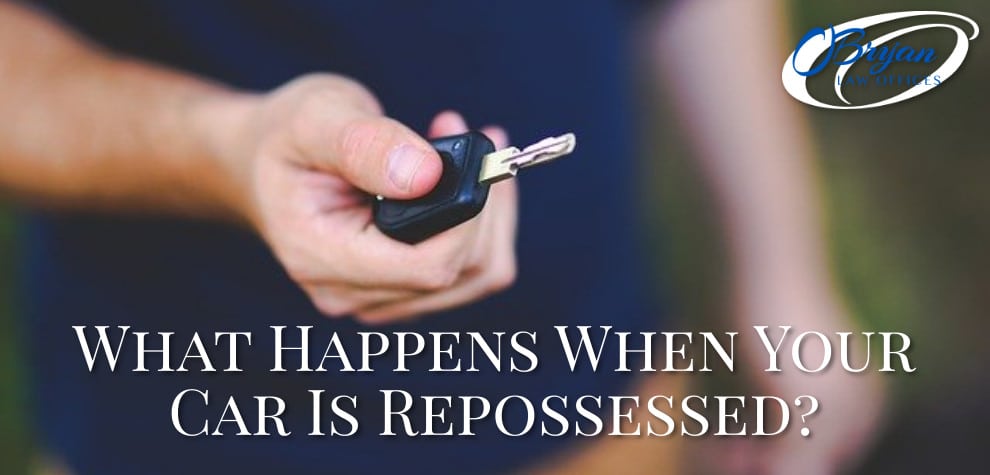Whether your car is your prized possession or simply just a means of transportation, we know how important it is to you. However, as anyone who owns a car knows, it can really put a dent in your wallet. On top of things like gas and general maintenance and upkeep, monthly car payments can weigh heavy on your finances. Especially in the case that you have other debts you need to pay off. Even so, no one ever expects that their car might be in danger of repossession. It’s a sad reality, unfortunately, that car repossession is fairly common. But what happens when your car is repossessed?
Where does it go and what can you do to get it back? Here, our proficient Louisville bankruptcy attorneys at O’Bryan Law Offices will answer those questions and more. If we don’t address your specific concern, please feel free to reach out to our Kentucky or Indiana offices today.
Repossessed Car
You’ve probably heard of car repossession or repo, but do you know the legalities behind it? Repossession is the action of regaining possession of certain property when a buyer falls behind on payments. In this case, it is when the seller or lender of a vehicle retakes possession of that vehicle because of a default on payments.
When you take out an auto loan and plan to finance a car, you are signing a legal agreement that you intend to make the required payments each month. You are also signing an agreement saying that if you fail to do this, your lender has the right to repossess the vehicle without invoking court proceedings. Thus, the lender is legally allowed to take your car anywhere at any time, whether you’re at work or home or somewhere in between.
Each state possesses its own laws regarding car repossession. Many states don’t even require the lender to notify you of their plan to repo your vehicle. You may just wake up one morning and find it gone with seemingly no explanation.
What happens after repossession of a car?
There are still ways you may be able to get back your repossessed car in Kentucky, should you choose. Once they repossess it, your lender should provide you with a timeline for how long you have to come up with the money to reinstate your loan. You will need to pay any past due balances as well as any fees associated with the repossession itself. This may include things like towing and storage fees.
In addition to reinstating your loan, you may also redeem the car entirely. This is when you would pay the full amount of the car, including any past due payments, the remaining balance, and costs associated with repossession. This may be an unlikely option because if you struggled to make monthly payments before, you probably don’t have the means to pay it off entirely now. However, the option is still available to you.
There is another option if you’re unable to redeem or reinstate your loan. A lender may either choose to keep the repossessed vehicle or resell it. If they sell it, they may do so at a public auction or a private sale. Kentucky repossession laws require lenders to notify you of the date, time, and place they plan to auction off your car. You can attend the auction and bid on your own vehicle, given you have the means to pay for it. If the car is to be privately sold, they must inform you of the date of this transaction, as well.
If you decide against getting your car back, you’ll likely still want to collect your belongings from within the car. By law, the lender who repossessed your car must return your belongings to you. While they can auction off your car, they cannot do so with the personal property within the car.
Can bankruptcy stop repossession of vehicle?
Many people assume that filing for bankruptcy means you have to sell property and possessions like your car. While this might be the case, specifically in KY Chapter 7 bankruptcy, it is not always true. Filing for bankruptcy, either Chapter 7 or Chapter 13, can actually temporarily stop a lender from repossessing your vehicle. This is due to the automatic stay provision found in the U.S. Bankruptcy Code. In some Chapter 13 bankruptcy cases, the law also allows you to recover an unsold repossessed vehicle. If you believe your vehicle is in danger of being repossessed, filing for KY Chapter 13 can help reduce your payments while still allowing you to keep your car.
Bankruptcy can put a temporary halt on your previous payment plan and give you and your bankruptcy attorney time to renegotiate a new payment plan with your creditor. However, if your vehicle has already been resold, you will not be able to reclaim it. Ask your attorney if filing for bankruptcy is the best option for you and if it may stop the repossession of your vehicle.
Repossession and Bankruptcy Discharge
Once debts become discharged through a bankruptcy claim, they are gone forever. This makes it illegal for creditors or lenders to attempt to collect these debts from you. However, repossession of secured debts, which includes vehicles, is different. Lenders are still able to repossess your secured debts after a bankruptcy discharge. This is due to the fact that the repossession of collateral is not the same as attempting to collect from you personally.
Car Repossession After Chapter 7 Discharge
Unfortunately, a creditor is legally able to repossess your vehicle after a Chapter 7 discharge. This is because the lien on the car, which is a legal claim against certain property, isn’t included in the erasure of debts after bankruptcy. What this means is that while bankruptcy can temporarily halt the repossession, it cannot protect against it entirely. If you file for bankruptcy and then eventually default on your monthly payment, the lender possesses the right to take back the vehicle with no prior notice.
In addition to repossessing the vehicle, the lender or creditor may also attempt to collect payments for any deficient balance. This may result in them taking collection action by sending bills, making collection calls, or even filing a lawsuit against you. Should they win the lawsuit, they may even be able to garnish your wages.
Avoid Getting Your Car Repossessed, Call O’Bryan Law Offices Today
Many people remain unfamiliar with the technicalities of repossession. Hopefully this post helped you understand what happens when your car is repossessed. To avoid repossession altogether, there are some simple measures you can take. These include making payments on time, limiting how many credit accounts you open, and paying down your credit card debt in regular intervals. Our attorneys at O’Bryan Law Offices can help you formulate a plan to do this. We can also assist you in filing for bankruptcy, should it come down to that.
The most important thing you can do in the event that your property becomes repossessed is to know your rights. The repossession process can be extremely challenging to deal with and often leaves people wondering where to turn next. In danger of car repossession? We can help. If you have any more questions like “What happens when your car is repossessed?”, call the experienced bankruptcy attorneys at O’Bryan Law Offices today.








